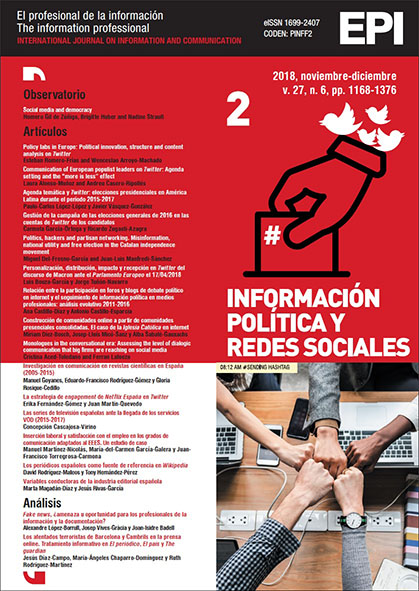Job placement and satisfaction with employment in the Communication university programs adapted to the EHEA. A case study
DOI:
https://doi.org/10.3145/epi.2018.nov.14Keywords:
University programs, EHEA, Communication, Employability, Job placement, Job satisfaction, Satisfaction with employment, Spain.Abstract
The implementation of the European Higher Education Area (EHEA), effective in Spain since the 2008-2009 academic year, raised the need for universities to actively commit to employability, but the study of the work trajectory of the new graduates has been practically unattended in Spain. In this paper we analyze the employment details in the three years after graduation of the graduates from the communication programs who finished their studies at the Rey Juan Carlos University (Madrid) between the academic years 2012-13 and 2015-16. Employment period of the analyzed cohorts takes place between 2014 and 2017. The results indicate a deep deterioration of the labor market in the communication sector in 2014, when only 30% of the recent graduates had an occupation according to their training profile one year after graduation. Employment in the sector has been recovering since 2015. In the years following, around 50% of graduates accessed the specific labor market after one year, and specific employment reached almost 70% in the third year after graduation. However, even relying on the stability of their jobs, recent graduates see few options for improvement and professional growth in the communication sector.
Downloads
References
APM (Asociación de la Prensa de Madrid) (2017). Informe anual de la profesión periodística. Madrid: APM. http://www.apmadrid.es/publicaciones/informe-anual-de-la-profesion
EHEA (European Higher Educacion Area) (2007-2009). Work programme 2007-2009. Employability. http://www.ehea.info/pid34786/employability-2007-2009.html
García-Manjón, Juan-Vicente; Pérez-López, María-Carmen (2008). "Espacio Europeo de Educación Superior, competencias profesionales y empleabilidad". Revista iberoamericana de educación, v. 46, n. 9. https://rieoei.org/RIE/article/view/1886
Global employability university survey and ranking (2017). Méthodologie. http://www.emerging.fr
Hernández-Armenteros, Juan; Pérez-García, José-Antonio (2017). La universidad española en cifras, 2015/2016. Madrid: Conferencia de Rectores de las Universidades Españolas (CRUE). ISBN: 978 84 697 6269 1 https://goo.gl/Y7jvaJ
Hillage, Jim; Pollard, Emma (1998). Employability: developing a framework for policy analysis. Londres: Department for Education and Employment. https://goo.gl/tndXkj
INE (Instituto Nacional de Estadística) (2015). Encuesta de inserción laboral de titulados universitarios 2014. https://goo.gl/EWNmsF
Jiménez-Vivas, Amparo (2009). "Contexto actual y determinantes de la inserción laboral de los titulados universitarios. Directrices para el análisis". Educar, n. 44, pp. 47-58. https://goo.gl/3EvZH6
Michavila, Francisco; Martínez, Jorge M.; Martín-González, Martín; García-Peñalvo, Francisco J.; Cruz-Benito, Juan (2016). Barómetro de empleabilidad y empleo de los universitarios en España, 2015 (Primer informe de resultados). Madrid: Observatorio de Empleabilidad y Empleo Universitarios. ISBN: 978 84 608 5817 1 https://www.uoc.edu/portal/ca/qualitat/documentacio/INFORME_OEEU_2015.pdf
QS Graduate employability ranking (2018). Methodology. https://www.topuniversities.com/employability-rankings/methodology
Suárez-Lantarón, Belén (2014). "La universidad española ante la empleabilidad de sus graduados: estrategias para su mejora". Revista española de orientación y psicopedagogía, v. 25, n. 2, pp. 90-110. https://goo.gl/j6rTGN
Tejada-Artigas, Carlos; Moreiro, José-Antonio (2003). "Mercado de trabajo en Biblioteconomía y Documentación. Estudios sobre la inserción laboral de los titulados universitarios", El profesional de la información, v. 12, n. 1, pp. 4-9. http://www.elprofesionaldelainformacion.com/contenidos/2003/enero/1.pdf
Times Higher Education (2017). Best universities for graduate jobs: Global university employability ranking 2017. https://goo.gl/ZK64DB
Downloads
Additional Files
Published
How to Cite
Issue
Section
License
Dissemination conditions of the articles once they are published
Authors can freely disseminate their articles on websites, social networks and repositories
However, the following conditions must be respected:
- Only the editorial version should be made public. Please do not publish preprints, postprints or proofs.
- Along with this copy, a specific mention of the publication in which the text has appeared must be included, also adding a clickable link to the URL: http://www.profesionaldelainformacion.com
- Only the final editorial version should be made public. Please do not publish preprints, postprints or proofs.
- Along with that copy, a specific mention of the publication in which the text has appeared must be included, also adding a clickable link to the URL: http://revista.profesionaldelainformacion.com
Profesional de la información journal offers the articles in open access with a Creative Commons BY license.




